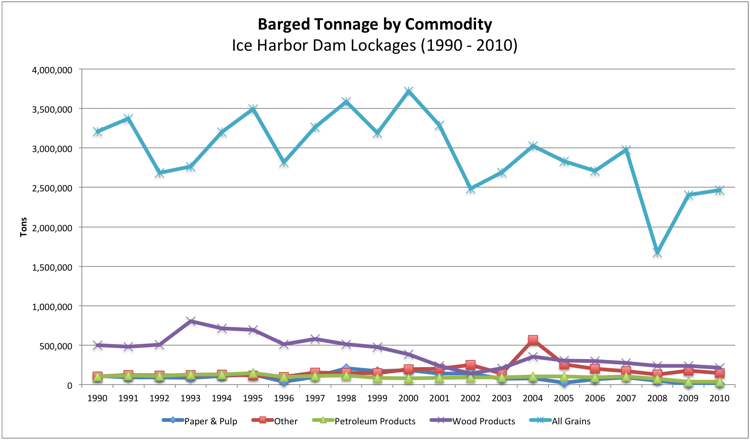forum
library
tutorial
contact

Official Hints at Possible Return of Container Traffic
by Elaine WilliamsLewiston Tribune, June 11, 2015
|
the film forum library tutorial contact |

|
Official Hints at Possible Return of Container Trafficby Elaine WilliamsLewiston Tribune, June 11, 2015 |
Sean O'Connell of Pacific Northwest Farmers Co-op says losing water transportation
is a big blow to the entire region and worries that growers will plant other crops
 One small-scale carrier is scheduled to call on the Port of Portland once in July, providing a glimmer of hope that container operations might resume on the Snake and Columbia river system.
One small-scale carrier is scheduled to call on the Port of Portland once in July, providing a glimmer of hope that container operations might resume on the Snake and Columbia river system.
Westwood Shipping has announced the plans, and the Port of Portland in Oregon is hoping service it receives will keep the company coming back, said Sebastian Degens, general manager of marine and terminal business development at the port.
Degens visited Lewiston Wednesday and spoke at the Port of Lewiston commission meeting. He also met with container shippers in the Lewiston area.
"We're determined to be successful in rebuilding that service," Degens said.
Westwood was the smallest of three container carriers that called on Portland in the past year. All of them suspended service. Those decisions shut down container operations at the Port of Lewiston, which mostly handled dried peas and lentils.
The carrier departures followed a protracted dispute between union labor and ICTSI Oregon, the private company that has roughly 20 years left on a 25-year contract to operate the Port of Portland's container terminal. That conflict has been blamed for slow handling of containers at the Port of Portland.
While Westwood's return is welcomed by the Port of Portland, it doesn't mean the situation is back to normal. Each of its ships can only carry about 220 containers, compared with the 800 to 1,000 that go on larger vessels, Degens said.
In addition, Westwood will receive an incentive of $50 per loaded container from the Port of Portland. Degens said ICTSI has kept all its employees on staff and is doing training so it's prepared when container traffic resumes.
"The relationship (with labor) is improving, but it's fragile," he said.
Representatives of ICTSI and union labor weren't at the meeting.
The Port of Portland once operated the terminal, but struggled with the capital requirements of the business and became one of the last ports to transfer its duties to the private sector, Degens said.
Given the continuing uncertainty, the Port of Portland is looking into other possibilities to bridge the gap until container shipping is back on track. Degens said containers might be barged from Lewiston or other places upriver to Boardman, Ore., where they could enter Portland by rail and be transferred to trucks in Portland for a short trip to the Port of Portland.
If a container carrier wasn't available in Portland, the containers could go to the Puget Sound ports by rail, Degens said.
Related Pages:
Energy Intensities of Freight: Barge, Truck and Railroad US Department of Energy, Transportation Energy Data Book
Economic & Environmental Impacts of Extended Lock Outage by Dr. Ken Casavant, Freight Policy Transportation Institute, 8/11
Industry Reactions to the Columbia-Snake River Extended Lock Outage by Dr. Ken Casavant, Freight Policy Transportation Institute, 6/11
Related Sites:
Columbia Snake River System Extended Lock Closure by Pacific Northwest Waterways Association
From Survey conducted following the 2011 Extended Lock Outage (see Economic & Environmental Impacts of the Columbia-Snake River Extended Lock Outage by Dr. Ken Casavant Freight Policy Transportation Institute, August 2011)
Table 2.3 Typical Wheat Transportation Rates by Survey Respondents
Source: Elevator Firm Survey (Washington, Oregon and Idaho) - Washington State University ($/bushel)Region Number of Firms Direct Truck to Final Market Truck-Barge Rail Eastern Oregon 5 $0.50 $0.29 $0.58 Northern Idaho 5 $1.50 $0.58 $0.73 Southern Idaho 3 $0.71 $0.86 $0.83 Northern Washington 5 $0.52 $0.57 $0.54 Southern Washington 8 $1.22 $0.47 $0.55 Pacific Northwest 26 $0.89 $0.55 $0.65 (bluefish adjusts for
volume differences by
region, Table 3.1)$0.92 $0.51 $0.59 Excerpt from Economic & Environmental Impacts of the Columbia-Snake River Extended Lock Outage by Dr. Ken Casavant Freight Policy Transportation Institute, August 2011: However, energy consumed per ton decreased 4.8 percent due to the heavy use of rail, which is more energy efficient than barge or truck, and the increased use of barge prior to and after the lock outage.
learn more on topics covered in the film
see the video
read the script
learn the songs
discussion forum
